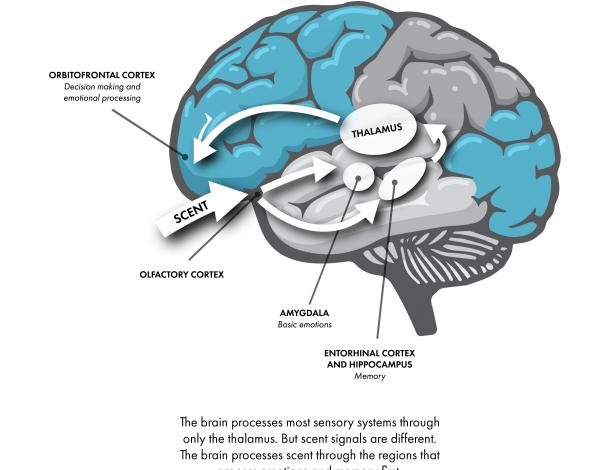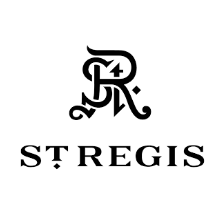The Science That Powers the Experiences
In Scent Marketing , we harness the brain’s reaction to smells to communicate intangible ideas. If you’ve ever walked into a retail space and instantly understood the meaning of their brand, you probably have a clear idea of what Scent Marketing can do.
There are mountains of research on scent, emotion, and Scent Marketing. Researchers around the globe have conducted field studies on the effects of ambient scent. And our own clients have conducted and shared the findings of independent research on the value of Scent Marketing.
But to truly understand what Scent Marketing is capable of, you must understand the science of scent. Most importantly, how we process and interpret scents. It’s the interpretation of a fragrance that bridges the divide between your customers and what you want them to think and feel about your business.
The more you come to understand how the science of scent works, the more you’ll want your business to reap the benefits of it.

The Nobel Prize Winning Research On Scent
In 1991, research was published by Richard Axel and Linda Buck on how the olfactory system works. It was groundbreaking research. Until then, the olfactory system was a mystery in the scientific community. But Axel and Buck were able to uncover the truth of how we experience the world through smell.
They wanted to find out how mammals detect so many different odorants. But besides odor detection, they wanted to learn how the brain interprets the odors into unique odor perceptions and behaviors. As Axel has explained “the richness of the external world has to be represented in the brain by simply a collection of neurons.”
Axel and Buck were shocked by their findings. Their work found that we perceive scent through at least 1,000 receptors. In contrast, the eye only uses three receptors to distinguish colors.

Fragrances are first detected by olfactory sensory neurons.
These neurons are in the lining of the nasal cavity. From the nasal cavity, the neurons signal the olfactory cortex via the olfactory bulb in the brain. Once the olfactory cortex receives the signal, it sends the fragrance information to several other areas in the brain. Areas like the higher cortical and deep limbic areas. They regulate the emotional and physiological effects of odors.
“The richness of the external world has to be represented in the brain by simply a collection of neurons.”
It’s Not Just Physical, It’s Emotional
Obviously, the research clearly shows scent has the power to affect our emotional state. But what does that mean in the context of a business? In the wake of the Ecommerce boom, customer expectations have changed. In today’s competitive landscape, being satisfactory is akin to being mediocre.
Recent research shows that customers seek emotional experiences. In fact, the Harvard Business Review conducted a study on the importance of connecting emotionally with customers. They found that emotionally connected customers are 52% more valuable to a brand than those who are just satisfied.
A separate study conducted on the other side of the world made startlingly similar discoveries. Researchers from Yonsei University studied the importance of managing customer emotions in luxury retail settings. They found that managing customer emotions helps improve brand perception and influence attitudes toward the brand.
“Emotionally connected customers are 52% more valuable to a brand than those who are just satisfied.”
This all makes a lot of sense. But emotions control our decisions more than we realize…
Emotions are actually at the core of all human behavior. Groundbreaking research conducted by the Department of Neurology at University of Iowa College of Medicine studied the importance of emotions on our decision-making ability. Their work brought them to study people with damage to the part of the brain that experiences emotions. These people appeared to have completely normal brain function; they just couldn’t feel any emotion.
But here’s the interesting thing: they all struggled with decision making. Though they intellectually knew they had to make a choice, say between eating chicken or fish, they were unable to choose.
This work shows a clear link between our emotions and decision making. Obviously, this has incredible implications for businesses. When a customer needs to make a buying decision, a strong emotional link could make the difference between who they choose to buy from.
Testing Scent Marketing
Scientists know that scent creates meaning in the brain. And the research clearly shows that harnessing emotions is important in making strong connections with customers. But many researchers have gone deeper into the study of scent, emotion, and consumers.
According to branding expert and author Martin Lindstrom, “of all the senses, smell is the most persuasive.” Lindstrom has taken a particular interest in the field of sensory marketing and sensory branding. Even going so far as to conduct independent research in the study of sensory marketing.
Lindstrom’s studies and extensive research were captured in his book Brand Sense. His findings expose the untapped potential of the senses for businesses. One study found that by activating more senses in consumers, they form more sensory memories. And the more sensory memories a consumer associates with a brand, the stronger the bond is between them.
“Of all the senses, smell is the most persuasive.”
But Lindstrom isn’t the only researcher interested in how scent can be used to influence consumers. Researchers across the world have conducted countless studies on the subject. The conditions of these studies are broad. You’ll find studies that examine the use of scent for a variety of purposes. And in diverse settings.
The astounding results of the research indicate that scent can impact:
Brand Recall
Two studies conducted out of Rutgers University looked to determine if ambient scent could heighten memory for branded products. The results of both studies were the same. Ambient scent improves recall and recognition of familiar and unfamiliar brands.
Brand Perceptions
A field study, conducted in a thesis for Concordia University in Montreal, Quebec, examined fragrance use in hotels. Researchers tested the ability of ambient scent to create a positive first impression in an urban hotel. The results found that a fragrance matching a hotel’s brand identity generates more favorable brand associations from guests. Guests report higher perceptions of comfort and cleanliness. Plus, they report feeling more eager to spread the word about the hotel.
Overall Customer Experience
After the ban of smoking in bars and clubs, it became apparent that smoke actually covered unpleasant smells in most nightclubs. Researchers speculated that ambient scent could help improve club atmosphere. Plus, provide a point of differentiation among competition. Researchers conducted a field study on the effect of ambient scent in three dance clubs. Results showed ambient scent significantly improved guest experience. It even brought more club-goers onto the dance floor!
Customer Response to Products & Retail Environments
Significant research has been conducted on the effect of scent in retail environments. Most studies have found a strong connection between scent and how customers shop. One study confirmed that our emotional reaction to scent is what actually drives the effect of ambient scent in retail.
Scent has been shown to keep customers in stores longer. Customers perceptions of products and stores improve with scent. And scent even encourages spending. Despite the measurable impact of scent, one study showed less than 10% of shoppers interviewed were aware that scent was being used.
Another study out of Iowa State University measured how ambient scent effects customers’ response to products. The results showed that a congruent fragrance improved customer attitudes toward the tested product and their intent to purchase.
Foot Traffic
A thesis out of the University of Tartu included a field study on how scent can influence foot traffic. The researchers examined the movement of visitors throughout a scented museum. Researchers were able to observe and track changes in the movements and behaviors of the museum visitors. They stressed the value of their finding for retail spaces. Or any environment where moving people through a space is important.
Mood Regulation
Researchers conducted a study to assess how well the scents of lavender and rosemary regulated mood following an anxiety-provoking task. They found that both lavender and rosemary reduce anxiety in high-stress situations.
Obviously, for businesses with the ability to reach customers in person, scent is a valuable tool to quickly and easily connect with customers.
Our Client Research
Our clients have conducted their own research to determine the validity of their investment in Scent Marketing. Their findings revealed the value you can expect from Scent Marketing.



Find out what your business can achieve when customers know your brand so well, they know it by scent alone.
Find out what your business can achieve when customers know your brand so well, they know it by scent alone.

 MENU
MENU CLOSE
CLOSE






